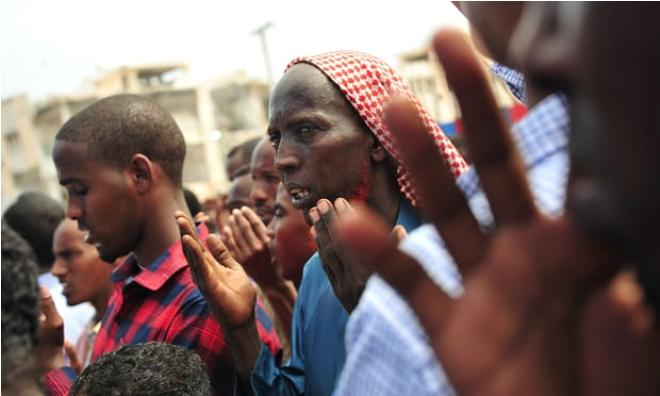
Nadifa Mohamed
Monday October 23, 2017

Somalis commemorate the victims of the Mogadishu truck-bomb attack that left more than 350 people dead. Photograph: Mohamed Abdiwahab/AFP/Getty Images
For over a week now, since the shocking attack that killed hundreds of people in Mogadishu, I’ve been seeking to raise money for the only free ambulance service in the Somali capital. But as the days have gone I’ve noticed just how muted the public and official response has been to what – with 358 dead, 56 missing and 228 injured – must count among the world’s worst terror atrocities.
On hearing the first reports and seeing pictures of the vast black plume of smoke, I realised this was unlike the typical, low-level terror attacks that have plagued Mogadishu.
The Zoobe district was a lively area shaded by palm trees, full of small traders, businesses, hotels and cafes – with a busy four-lane highway cutting through it. At 3pm on the day, people were shifting gears: from primary school to home, from university to socialising, from siesta to work. Suddenly every building in the district was flattened, ash and dust billowing away to reveal total devastation – as if the district had seen months of war and heavy shelling.
The remains of the first 165 unidentified victims were so badly damaged that what could be found was hastily buried in a mass funeral the next day. The truck bomb went off beside a fuel tanker so there are people who will never be traced, whose disappearance has left families emotionally and financially crippled. You see their names and faces on Gurmad252, a crisis response organisation staffed by volunteers who aim to identify the victims of the attack and raise funds for the survivors. Many of the missing were just starting their lives, unsurprising for a country where 62% of the population is under 24 years old: they include first division footballers (Mustaf Qoor), medical students just about to qualify (Maryan Cabdullahi), shoe-shiners (Catar Aden) and so many more.
The militant group al-Shabaab, which has lost much of the territory it controlled in Somalia over the last few years, continues to snipe away at soft targets. It is yet to take responsibility for the Zoobe attack, but there is little doubt regarding its culpability.
The famed make-do-and-mend resilience of Mogadishu is built on the reputation of groups such as Aamin Ambulance. I had first seen their work online, a few months ago, when they responded to a much smaller attack.
They rushed to the scene even though security forces often fire at ambulances in the confusion of smoke and crowds. And when I contacted them via Twitter on the night of the attack their primary concern was not for themselves, but whether there would be another attack that they would not have the resources to deal with.
Led by a dentist, Abdulkadir Adan – who was inspired by the work of the Pakistani humanitarian Abdul Sattar Edhi – the service rushes into danger zones in a fleet of second-hand ambulances that once belonged to the fire service of a tiny Japanese island. They needed radios urgently, Adan said, because they relied on mobile phones to communicate, and the network was jammed with people trying to locate loved ones.
The GoFundMe appeal for Aamin Ambulance quickly took on a life of its own with donations from the supermodel Iman, the rapper K’naan and the group Coldplay: from Finland to South Korea, money arrives.
We raised our target two times, and were elated when the United Nations donated 36 radios – so we could concentrate on other urgent supplies. I saw humanity and solidarity and didn’t think to ask who hadn’t been moved by this catastrophe – until I realised that London, my home city, had not marked this atrocity the way it has those in western cities: no flags at half-mast, no illumination of the London Eye in the blue and white of the Somali flag – not even a tweet from mayor Sadiq Khan. This failure to respond publicly was not inevitable but a choice – a choice that was not made in Istanbul, Toronto, Paris or Kuala Lumpur.
So how many dead Somalis does it take to muster the kind of sympathy that gushes out for cities closer to home?.Well, it seems that 358 dead is too low.
Despite some western newspapers, including the Guardian, putting the attack on their front pages, compassion seems to be ebbing daily. There are many out there who prefer easy, flippant excuses – “That’s the religion of peace for you” – than to use their imagination and curiosity to offer sympathy to an individual who suffers and grieves no less than they.
Donate at : https://www.gofundme.com/HelpAaminAmbulance